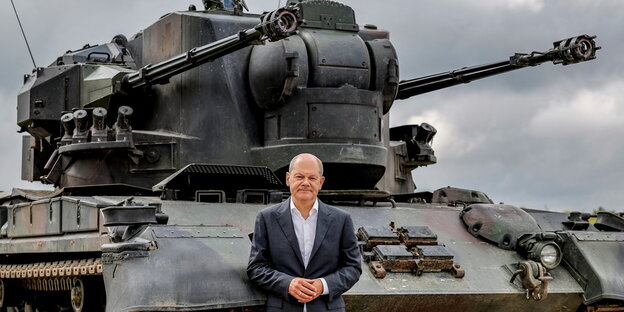The dispute over finances for 2025 is in full swing. To secure money for the army, Federal Finance Minister Lindner wants to make social cuts.

Chancellor Olaf Scholz in front of a German tank during a visit to the training program for Ukrainian soldiers Photo: Axel Heimken/Reuters
SEDAN taz | The Bundestag did not approve the budget for this year until February. But the negotiations are now moving into the next round, as Federal Finance Minister Christian Lindner (FDP) is preparing the federal budget for 2025. His draft budget is still missing double-digit billions; In some cases there is talk of 25 billion euros. How these gaps could be filled will likely continue to be discussed in the coming months.
One option for the government would be to cut spending and reallocate funds from some federal ministries to others. As with the 2024 budget, the SPD, Greens and FDP will probably also follow this path for 2025. Because the other option – higher income – probably will not work. Economic growth is too low for that. And Lindner rules out both higher tax increases and more extensive debt.
The FDP Finance Minister sees in the budget of the Federal Labor Minister Hubertus Heil (SPD) a place where a few billion euros could be obtained. The government must “create social systems in a sustainable way,” Lindner said recently. For example, spending on the long-term unemployed should be reduced by requiring them to take unattractive jobs.
In fact, the budget of the Minister of Labor and Social Affairs is the largest of the entire budget. This year Hubertus Heil has 176 out of 477 billion euros, a good third. Most of this (around €130 billion) is spent on pensions and basic old-age security. Another 47 billion euros go to citizens' money and similar benefits. However, these expenses cannot simply be reduced: they are partly based on rights that pensioners have acquired during their working life and partly they guarantee the absolutely necessary subsistence level of the poor. Large cuts in the social budget could be desired, but they are not realistic.
80 billion euros a year for the military?
This highlights new social benefits. On the initiative, among others, of the Green Family Minister, Lisa Paus, the government coalition wants to introduce basic child safety, which for the first time will cost around 2.4 billion additional euros in 2025. However, the FDP criticizes that they would create 5,000 new administrative positions to be able to disburse the money. Therefore, it seems conceivable that the project could be delayed, which would mean less spending in the 2025 federal budget.
This year the Bundeswehr budget amounts to 52 billion euros, approximately 11 percent of all expenses. In addition, a few billion euros could come from the special fund that the Bundestag created in 2022 due to the Russian attack on Ukraine. This amount, the coalition tells us, should not decrease in 2025, but it should not increase either, which could be problematic given Ukraine's military weakness.
To meet NATO's target of 2 percent military spending relative to gross domestic product (GDP) from 2028, the defense budget would have to increase to more than €80 billion a year, not least because then the special fund will be exhausted. To finance it at least partially, Lindner suggests postponing the payment of the Corona debt that falls due from 2020. This would be feasible, Lindner stated, if by then the public debt had fallen below 60 percent of GDP. This logic means: continue saving, there will be no new social spending, the army is more important.
In this context, it seems absurd that Finance Minister Lindner also raises the prospect of tax cuts that will reduce revenues and therefore increase the gap with expenditures. He advocates a higher basic income tax relief. And he would like to adjust overall tax rates so that all other employees pay less, too.
Can this still be prevented? The ministries should present Lindner with their own savings proposals by mid-April. To avoid too much turmoil, no decision will probably be made until the European elections in early June. This could come up in high-level talks between Chancellor Olaf Scholz (SPD), Economy Minister Robert Habeck (Greens) and Lindner before the Bundestag's summer break.